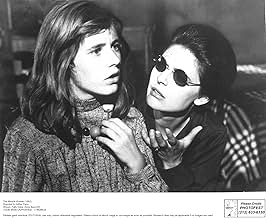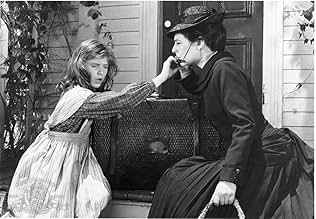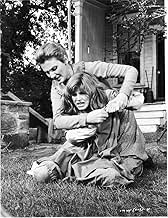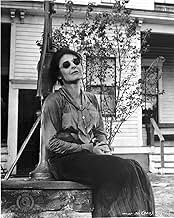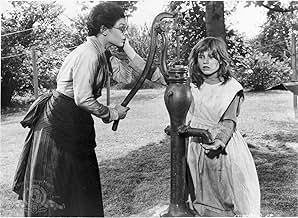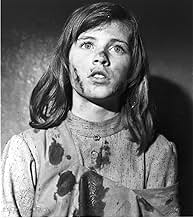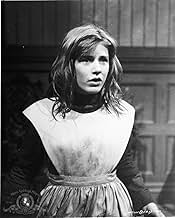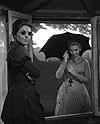NOTE IMDb
8,1/10
22 k
MA NOTE
L'histoire du combat d'Anne Sullivan pour enseigner à Helen Keller, aveugle et muette, à communiquer.L'histoire du combat d'Anne Sullivan pour enseigner à Helen Keller, aveugle et muette, à communiquer.L'histoire du combat d'Anne Sullivan pour enseigner à Helen Keller, aveugle et muette, à communiquer.
- Réalisation
- Scénario
- Casting principal
- Récompensé par 2 Oscars
- 13 victoires et 13 nominations au total
Maribel Ayuso
- Undetermined Role
- (non crédité)
Dale Ellen Bethea
- Martha at Age 10
- (non crédité)
John Bliss
- Admissions Officer
- (non crédité)
Grant Code
- Doctor
- (non crédité)
Michael Darden
- Percy at Age 10
- (non crédité)
Michele Farr
- Annie at Age 10
- (non crédité)
William F. Haddock
- 2nd Crone
- (non crédité)
Alan Howard
- Jimmie at Age 8
- (non crédité)
Judith Lowry
- 1st Crone
- (non crédité)
Helen Ludlam
- 3rd Crone
- (non crédité)
Beah Richards
- Viney - Keller Maid
- (non crédité)
Avis à la une
I bought this movie after having not seen it for a while, and watching it again was intensely powerful. I had never cried during the "water" scene, but I did this time. The scene in the dining room is magnificently filmed and exhausting to watch...to think Patty Duke and Anne Bancroft performed that scene every night on Broadway! Supposedly they wore multiple layers of padding. I don't know why they didn't create a new category for the Oscars that year, Best Double Performance in Leading Roles. They both richly deserved the Oscars they won, but I really couldn't choose between a leading role and a supporting role in that movie since Duke and Bancroft created such a beautiful and moving partnership. Having read a great deal about Helen Keller, including her own autobiography, I am still always amazed by her story and accomplishments. This movie is a brilliant testament to human strength.
I haven't seen acting like this in a long time! Patty Duke's portrayal of young Helen Keller shocked me with its intensity, rightness, and sensitivity. Anne Bancroft also played a tough role and did so brilliantly.
The other supporting roles were, of course, a bit stilted in the traditional Southern way, but added to the drama nonetheless. I still gave this movie a "10" despite having issues with the way director Penn handled the flashback scenes...a bit cheesy and not quite in keeping with the underlying plot in all cases. That said, the dinner scene with Patty Duke and Anne Bancroft is 100%+ riveting in a way seldom seen and the movie deserves its accolades just for that scene alone.
The other supporting roles were, of course, a bit stilted in the traditional Southern way, but added to the drama nonetheless. I still gave this movie a "10" despite having issues with the way director Penn handled the flashback scenes...a bit cheesy and not quite in keeping with the underlying plot in all cases. That said, the dinner scene with Patty Duke and Anne Bancroft is 100%+ riveting in a way seldom seen and the movie deserves its accolades just for that scene alone.
I don't think I've seen a movie with such amazing performances in a LONG time! The more work I see of Anne Bancroft, the more I'm impressed with her craft. I've never seen Patty Duke in anything before, so needless to say, I was blown away by her performance as well.
The most intense acting is done without any dialogue, especially where Anne Sullivan insists that Helen learn how to eat properly.
Such incredible performances (very Oscarly deserved!) and even more incredible story to boot!
The most intense acting is done without any dialogue, especially where Anne Sullivan insists that Helen learn how to eat properly.
Such incredible performances (very Oscarly deserved!) and even more incredible story to boot!
I'm not certain if it was fate but it is very interesting that I had the chance to finally see "The Miracle Worker" a few days after the sad news of the death of Anne Bancroft.
The film, based on the play by William Gibson, is an extremely well-acted film, brilliantly opened up on the big screen. Anne Bancroft as teacher Annie Sullivan and Patty Duke as young Helen Keller are outstanding. Sullivan's determination to communicate to the deaf and blind Helen made for a compelling story on stage as well as on screen.
I understand that when Hollywood wanted to make this movie, the powers-that-be did not want Bancroft or Duke. After finally seeing the movie, I'm glad that director Arthur Penn and producer Fred Coe chose to make this movie outside the so-called Hollywood establishment.
One scene that was discussed in some other posts was the dining room in which Sullivan forces Helen to eat food from a spoon and not her hands. It almost felt like I was watching a fierce wrestling match. It was a physical, as well as an emotionally draining, sequence. A battle of wills between teacher and the unwilling student. It was brilliantly edited and directed.
The film was not without faults. According to the IMDb, a number of flashback scenes were filmed in their entirety but did not work out very well. Those scenes were incorporated within the movie and it looked rather clumsy. The scenes could have been easily edited out completely.
As with all plays adapted to the big screen, some scenes were a little bit stagy. But that involved just a few scenes and, overall, it did not ruin the movie.
What I really liked about the movie was that the filmmakers were very successful at not succumbing to sentiment. This movie could have easily been very corny and sappy. Perhaps Bancroft and Duke and their performances had something to do with that.
I've been a fan of Anne Bancroft for many years and I'm very glad that I had the chance to see her well-deserved Oscar-winning performance.
RIP Ms. Bancroft.
The film, based on the play by William Gibson, is an extremely well-acted film, brilliantly opened up on the big screen. Anne Bancroft as teacher Annie Sullivan and Patty Duke as young Helen Keller are outstanding. Sullivan's determination to communicate to the deaf and blind Helen made for a compelling story on stage as well as on screen.
I understand that when Hollywood wanted to make this movie, the powers-that-be did not want Bancroft or Duke. After finally seeing the movie, I'm glad that director Arthur Penn and producer Fred Coe chose to make this movie outside the so-called Hollywood establishment.
One scene that was discussed in some other posts was the dining room in which Sullivan forces Helen to eat food from a spoon and not her hands. It almost felt like I was watching a fierce wrestling match. It was a physical, as well as an emotionally draining, sequence. A battle of wills between teacher and the unwilling student. It was brilliantly edited and directed.
The film was not without faults. According to the IMDb, a number of flashback scenes were filmed in their entirety but did not work out very well. Those scenes were incorporated within the movie and it looked rather clumsy. The scenes could have been easily edited out completely.
As with all plays adapted to the big screen, some scenes were a little bit stagy. But that involved just a few scenes and, overall, it did not ruin the movie.
What I really liked about the movie was that the filmmakers were very successful at not succumbing to sentiment. This movie could have easily been very corny and sappy. Perhaps Bancroft and Duke and their performances had something to do with that.
I've been a fan of Anne Bancroft for many years and I'm very glad that I had the chance to see her well-deserved Oscar-winning performance.
RIP Ms. Bancroft.
Although I am a long-time Patty Duke admirer, and thus far from objective, this film still stands the test of time. This is the kind of filmmaking that prompted me to fall in love with the movies. Brilliantly inspired writing by William Gibson, from his equally inspired play. Intelligent, austere direction by Arthur Penn (one of the true gentlemen and masters of the American cinema); Penn had the sense to retain the inate artistry and grit of the original stage play and simply allow the camera to capture the actors' intuitive - albeit, well rehearsed, performances, recreating their stage roles which generated an unheard-of 19 curtain calls when it first graced the stage in its Philadephia opening. The film, in stark, black and white, speaks total reality to the film audience of 1962 - and, of course, well beyond that year. Finally, one would be hard pressed to think of another film that so exquisitely defines the term "2-character" study. Bancroft and Duke deliver A-plus, no bones about it, top-drawer, performances. It is a film about the undaunted human spirit and our need to communicate. Although much has been written about 11-minute breakfast donneybrook, which is certainly wonderful cinema to behold, the entire film is breathtaking from opening credits to the final scenes. I dare anyone to even breathe during the climactic water pump scene when teacher Annie Sullivan finally "connects" and communicates with her "unreachable" charge, the deaf, blind, young Helen Keller. It's an absolutely astonishing, "can't take your eyes off it," moment of celluloid. Duke, Bancroft and Penn worked beatifully to create this incredibly touching masterpiece of dramatic filmmaking, which is not without its moments of "comedy," as all fine dramas are capable of conveying. It is a film which breathes life - and it is especially brought to life by two of the best actresses America has ever produced. The Miracle Worker is a story and film portraying real human courage, patience and individual, personal will. It continues to live in my memory as a work of art that has rarely been equalled before - or since - on screen.
Le saviez-vous
- AnecdotesMark Twain was the first person to refer to Anne Sullivan as "the miracle worker". Twain was a friend of Helen Keller.
- GaffesAnnie Sullivan has to look up the word discipline in a dictionary later in the film even though she's used it in a letter near the beginning; however, she remarks that she must know how to spell it before teaching it to Helen, and may have simply used her best guess in the letter since nothing was at stake.
- Citations
Annie Sullivan: Pity? For this tyrant? The whole house turns on her whims! Is there anything she wants she doesn't get? I'll tell you what I pity: that the sun won't rise and set for her all her life, and every day you're telling her it will! What good will your pity do when you're under the strawberries, Captain Keller?
- ConnexionsEdited into Histoire(s) du cinéma: Le contrôle de l'univers (1999)
- Bandes originalesHush, Little Baby
(uncredited)
Traditional Southern lullaby
Music adapted by Don Costa
Lyrics by Arthur Siegel
Sung by Anne Bancroft
Also played in the score
Meilleurs choix
Connectez-vous pour évaluer et suivre la liste de favoris afin de recevoir des recommandations personnalisées
Détails
Box-office
- Budget
- 500 000 $US (estimé)
- Montant brut mondial
- 4 139 $US
- Durée
- 1h 46min(106 min)
- Couleur
- Mixage
- Rapport de forme
- 1.85 : 1
Contribuer à cette page
Suggérer une modification ou ajouter du contenu manquant



